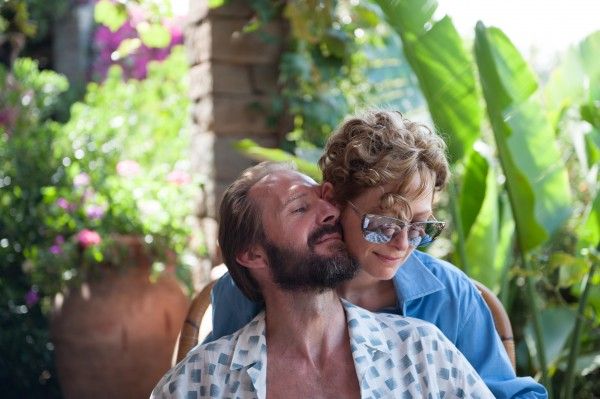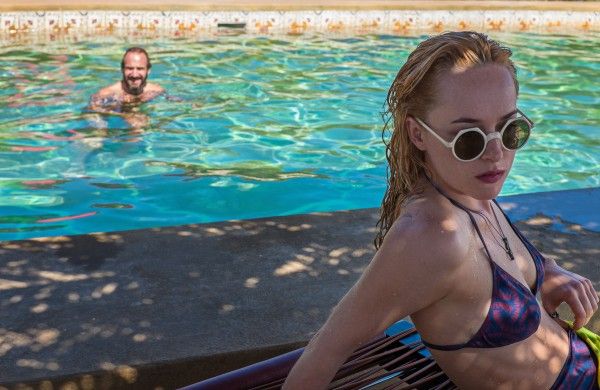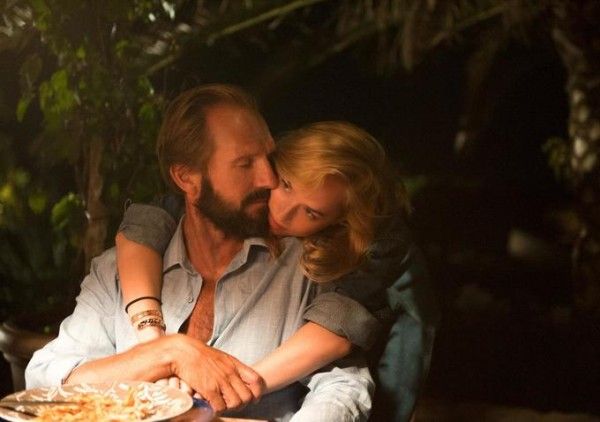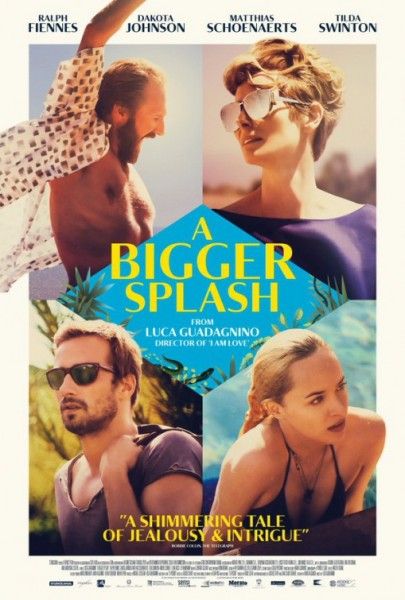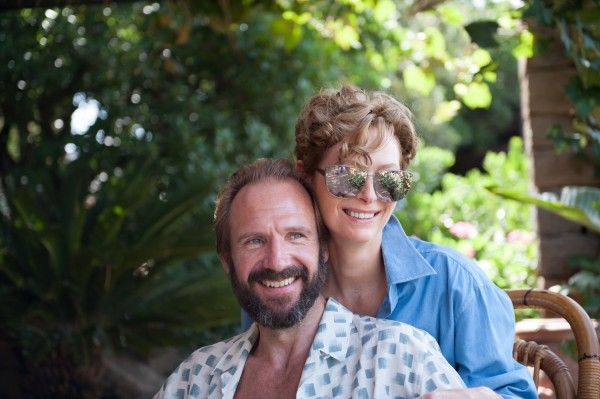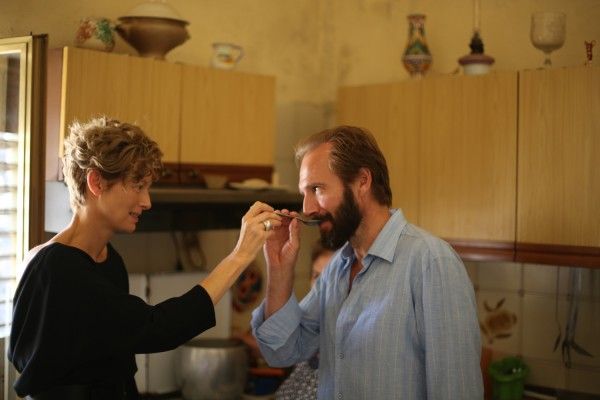Known for his work on everything from Schindler’s List to the Harry Potter series to his appearances in Skyfall and Spectre, it’s safe to say that the incredibly diverse Ralph Fiennes has never played a character quite like the one in Luca Guadagnino’s upcoming A Bigger Splash.
Fiennes stars as a bombastic and verbose record producer named (appropriately, alliteratively) Harry Hawkes, whose sense of moral anarchy and hedonism brings trouble to him in far more ways than one. Vacationing on a remote Sicilian island in order to visit his friend and ex-lover Marianne Lane (Tilda Swinton) while she recovers from a crippling vocal cord surgery, Harry brings along his newly discovered, but very grown up daughter Penelope (Dakota Johnson), a bewitching and mysterious blonde who seems to be trying on Harry’s devil-may-care attitude for size.
Disrupting the opulent drama-cum-travelogue’s placidity, Harry busts into Marianne’s constructed domestic paradise, changing the course of the film (and his life) into one on a collision-course with tragedy and disruption. Fiennes, who delivers a fantastic performance, is nothing less than fully committed to his often maddening portrayal, performing entire scenes while fully nude and indulging in a jubilantly freewheeling dance sequence that will have you forgetting the man ever convincingly played Voldemort. Ahead of the film’s release, I had a chance to sit down with Ralph Fiennes to discuss A Bigger Splash, working with Tilda Swinton and Dakota Johnson and committing to his hedonistic role.
QUESTION: So, your character, as frustrating as he is, he’s still quite charming. How were you able to balance those things and sort of make him a well-rounded figure?
RALPH FIENNES: I don’t know, I guess that’s just the job. I think he came alive to me on the page as a sort of rounded person, and also, it was there to be played. You’re not always going crazy, there are moments where he’s always watching people he’s quite observant. He sees everyone. For all his noise, and verbosity, I think he sees people. Picks up on people quite quickly. And it’s the job to make a character look more rounded, to look for the things that aren’t on the page. How you do it, I don’t know. Things happen as you’re playing and as you go through a scene. You’re always looking for other little moments and you hope the director will encourage you to find other variants. And then, the cliche, is it’s all cut together. The director and editor will all look to make it. There is some truth to the idea that a performance is made in the editing room. So, I think it’s a combination of a number of things.
Were you a big music fan, particularly of music of that time, before the movie or did you have to immerse yourself?
FIENNES: I liked the Rolling Stones, but I wasn’t a Rolling Stones expert at all. In fact, weirdly, I’d never seen them in concert until that summer. They were performing in Rome and we all went to see them. It was extraordinary, Mick Jagger had just turned 70 or something. He was dancing like a 16 year old. Extraordinary.
Did you have to sort of bug any music producers to get the scoop?
FIENNES: Well, my brother Magnus is a music producer. And has been for a long time, so he was my main source of referencing and talking to him about stuff. And a little bit of Harry is not unlike him.
I was fascinated by your character because the Tilda Swinton’s character is the rockstar, but you’re actually the rock star of the movie. A lot of producers feel like they’re a member of the band, but now that Harry has come back into her life, can you talk about the influence he had on her and how he sees himself in this situation where there’s a little bit of a power struggle?
FIENNES: Well, I’ve always felt like in the past he was a very good producer. So despite the party animal you meet who is cooking and dancing and being provocative and talking, I think actually he’s really, really good at putting music together and guiding a musical artist. I decided he was. And I think my brother is a great producer. When you meet him, he’s socially very engaging and very fun. But when he focuses in on the work, he’s very meticulous. And I think, the way I’d imagined the history of Marianne, a lot of her best recordings and her best work was for Harry. And that underpinning their relationship. And I don’t know who had, I think it was probably at its best very balanced: that she is a very gifted singer and he is very gifted at shaping her. But I, I think what my sense of the history is that he just couldn’t stop his hedonistic lifestyle and went off the rails to a point where she couldn’t handle it. There’s probably a world where occasionally someone goes and sleeps with someone else, people that sort of view it as water off a duck’s back in that environment. But I think probably he just kept on wearing it down to the point where she, in a way maybe he wanted – I had one backstory idea that he, it was something like having gotten her first album, the artistic connection was so intense. Because it’s sort of a muted emotional relationship and that he put everything into the work and somehow that had displaced their physical, emotional connection. Anyway, whatever has happened, she has walked away and gone, “I’ve had enough.” And has found and been empowered with a new sense of herself in her life with Paul (Matthias Schoenaerts) and I think Harry doesn’t like that. [laughs] Even though he’s been in a large part in making their relationship, human beings we go in these circular patterns, it all feels horribly familiar. [laughs]
I got that sense too. He knows that he gave her his best, and he wants to sort of recapture that feeling, that passion.
FIENNES: And also she gave him a focus, so I can imagine, I can imagine the best of it. A song is emerging in recording, suddenly you’re finding this thing and it’s happening. And then the bond between them as man and woman and artist, everything comes together. And that breeds a love between two people. A connection. They find that in their work they’re connecting and that supports their intimacy, and the best of it was that that was really amazing. But it’s in Harry’s nature to constantly, he sees a young girl who’s a backing singer and he chases her and doesn’t think. He’s a man who gives himself permission always to take what he wants. In that sense, selfish I suppose. But he’s existentially very free. And probably told himself that he didn’t want to be hemmed in by the obligations of the compromises of relationship and he’s realizing that he’s lost something.
So in developing all of this backstory, some of which the film the gives you and some of which you Luca and David had to come up with, but in developing that how much did you work with Tilda specifically or Matthias because you have such a sense of history with both of them. Did you collaborate?
FIENNES: We only talked about it a bit. I mean, we shared, sort of like now, shared our ideas. Tilda had strong ideas about her part and I had mine but I don’t think we… We pooled them, as it were. To listen to the other actor’s sense of their backstory and to make it part of yours. I mean, we really didn’t do a lot of… Some actors with some directors will do some sort of in-depth background work. But I think we just sort of loosely talked it through. And I think all of us sort of connected quite well as actors in our roles with each other. We knew who we were and what it was. And it felt like we all quite quickly were playing the right way. You sort of have to trust. Luca is very clever and very perceptive, I guess we trusted that he was seeing it working. The scene where we go to the restaurant, where Harry takes them up to that little pop-up restaurant on the hill, I felt, if I think back, I remember thinking, “Oh, the dynamics of the group are sort of how I’d imagined. I just remember thinking, “This seems to be that we’re all playing what was written on the page and finding little extra things.” I don’t know, a lot of the time you’re just plunging in on the day and you hope that the director is shaping it. You’re not, you have to surrender yourself to the script and the director and sort of plunge in and not be too self-conscious, too organized about stuff. Just do it, get up, just start, just see what happens.
And how much does the performance change when you’re doing multiple scenes with an actor who’s making the conscious decision to not respond to you, does it complicate things?
FIENNES: It was interesting in this because it seemed to sort of slightly give Harry’s verbosity more definition. In the sense that it gave me, I could be provocative. “Come on, you can talk.” You know? Initially, because I had agreed to be in a film where Marianne spoke. So initially I was, I think I was a bit cautious. I had to think through, I worried that it would take something away from Tilda’s Marianne. Would it be as it were, your dialogue is your ammunition, it’s what you can do. Tilda, she was very interesting last night in the Times Talk, she talked about why she wanted to not speak, it came from a degree, some stuff in her own life. But she’s interesting in inarticulacy, when people can’t. And I think she was really smart about it. I think it sort of gives an odd color to the film, an odd color. In a good sense, odd. And if you think about if it had just been dialogue, old lovers back and forth, we would have probably fallen into all kinds of slightly cliche-ridden areas. Someone saying, “I don’t want you here, this is my new life.” And though there is a bit of that, there it’s all through the context of her not able to speak and also probably not wanting to. In hindsight, once we started filming, I thought, this is working. It seemed a stroke of something, not stroke of genius necessarily but it would seem like a very smart choice that Tilda made and Luca loved it.
I was wondering if we could talk about Harry’s relationship with his daughter, sometimes it almost feels as if he’s ignoring her, as though she’s a new toy he’s gotten or something like that.
FIENNES: I didn’t feel that he was ignoring her so much as just he feels quite at ease in her company. But again, that’s another, they’ve just met, they’ve been traveling a bit. He loves how cool she is, how independent. He’s kind of intrigued by her. I think Harry’s the sort of guy who will feel someone’s energy quite quickly and he’s learned not to be over-attentive to Penelope and I think he sees that she is a sexual young creature and part of him is intrigued by that, but I don’t think he’s trying to sleep with her or anything like that. I think he’s sort of learning who she is, this new creature who is his daughter but also because he’s never experienced her as a child or as a baby, I would imagine that’s quite a weird one, if you suddenly, “Here is your daughter as a result of a fling you had years ago,” and this potent young woman enters the room. It’s probably a bit of a mind fuck. And how do you deal with that? I think Harry’s dealing with it quite well. I think they have a bond. There’s a couple of moments, I love working with Dakota, and again, I think we fell into a dynamic that I thought was quite right. They’re at peace with each other, and I think, what surprises Harry is that he’s quite protective of her. So, possibly hypocritically, but his feelings of anger that Paul might have slept with her, I find that very believable.
So much of what both of these characters are putting out is sort of sheathed in posturing or secrecy, how open do you think they were with one another?
FIENNES: I think, what Penelope and Harry? I think they are learning who each other is They’ve found a friendship, that’s what I’ve always thought. Despite knowing they are father and daughter, they are finding something. I think she’s, she’s a quite interesting character because some characters can see through adults’ bullshit. I think she sees through Harry’s bullshit. But also sees that he’s, you know, I can’t speak for Dakota. But I always felt that she wasn’t repulsed by Harry. She strikes me, as some young teenagers are, very canny about adult behavior. I think she’s like that, they see all the pretense and the posturing of adults. And I think she sees all that. I think she’s a really cool character, really.


